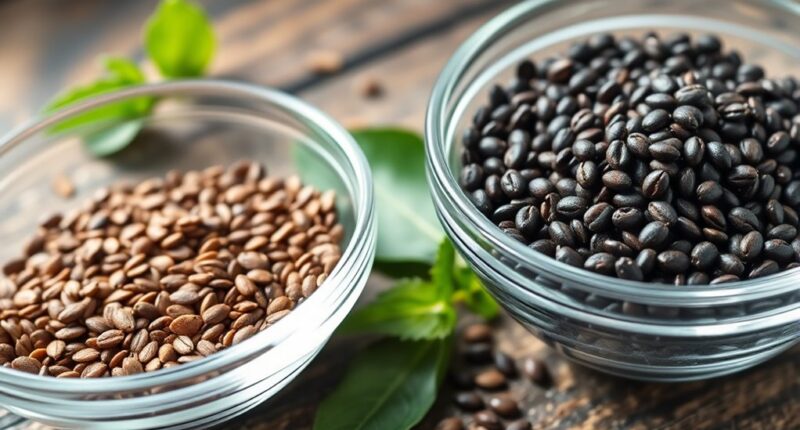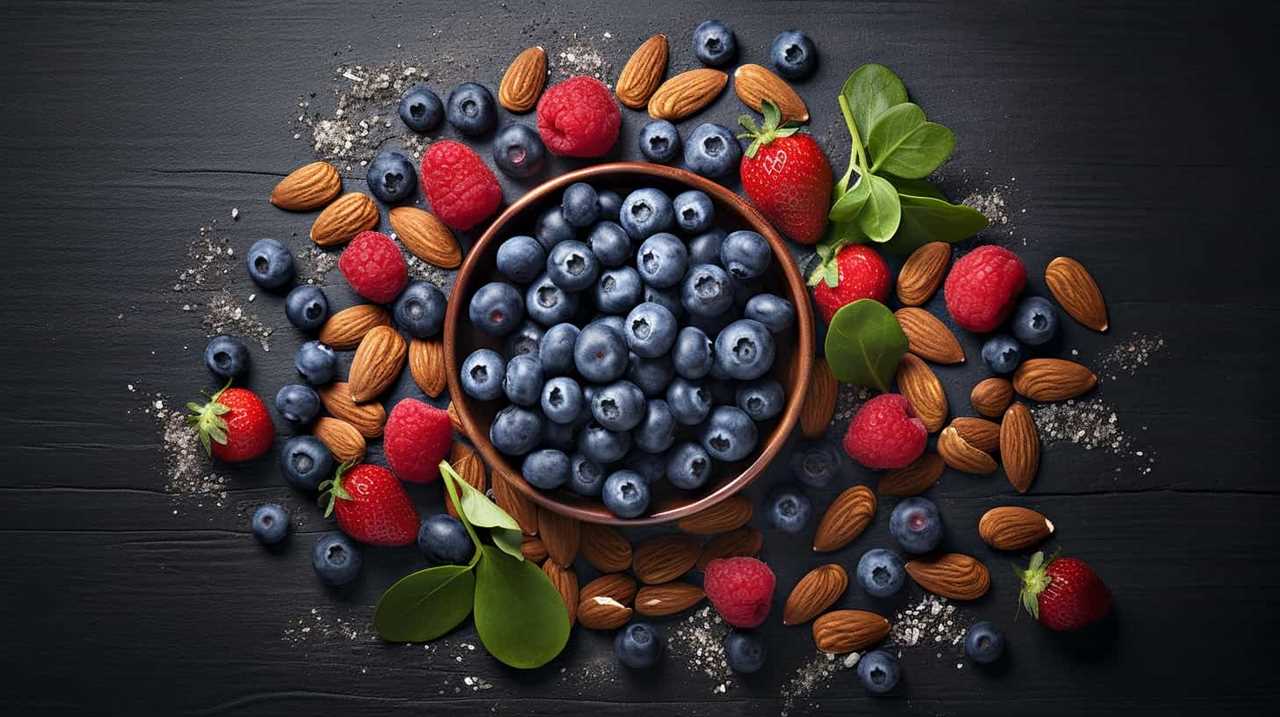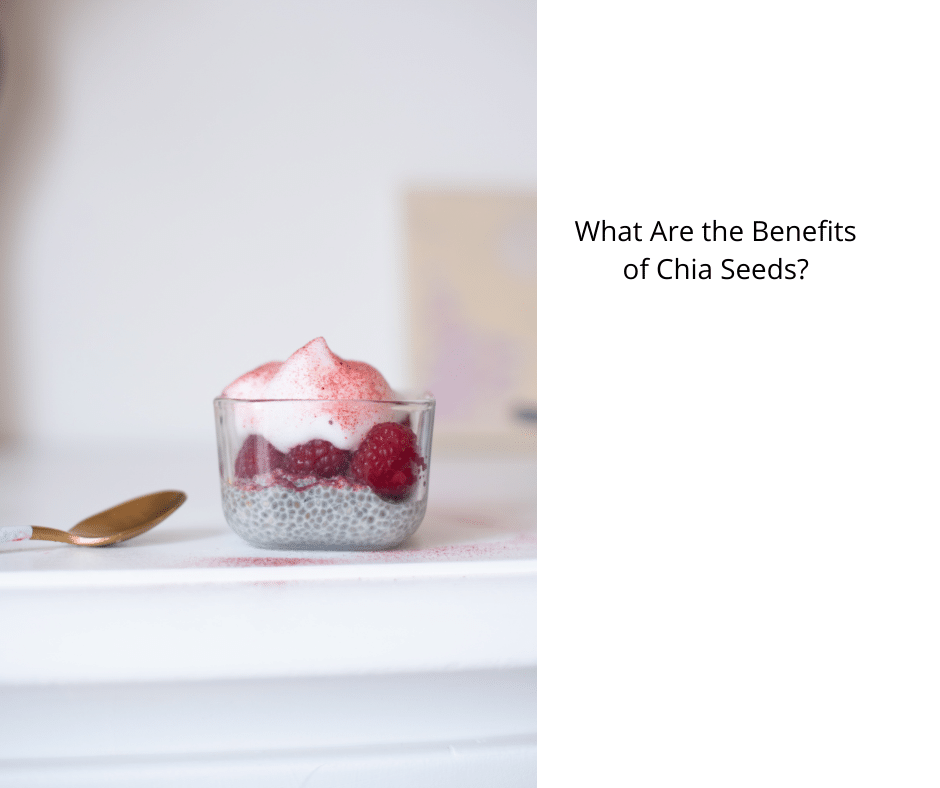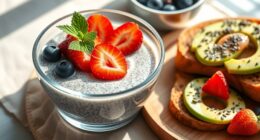If you’re choosing between chia and flax seeds for plant-based omega-3s, chia wins because it provides about double the ALA content per serving. It also offers a broader range of nutrients and antioxidants, boosting overall health. Plus, chia’s gel-like consistency may improve digestion and absorption. For those looking to maximize omega-3 intake naturally, chia seeds are the smarter pick—stay with us to learn more about their benefits.
Key Takeaways
- Chia seeds contain nearly double the omega-3 ALA per serving compared to flax seeds.
- They offer a broader nutrient profile, including more fiber, minerals, and antioxidants.
- Higher ALA content in chia may improve conversion rates to EPA and DHA.
- The gel-like consistency of soaked chia enhances digestion and absorption of omega-3s.
- Chia’s superior omega-3 density makes it a more effective plant-based source for omega-3 intake.
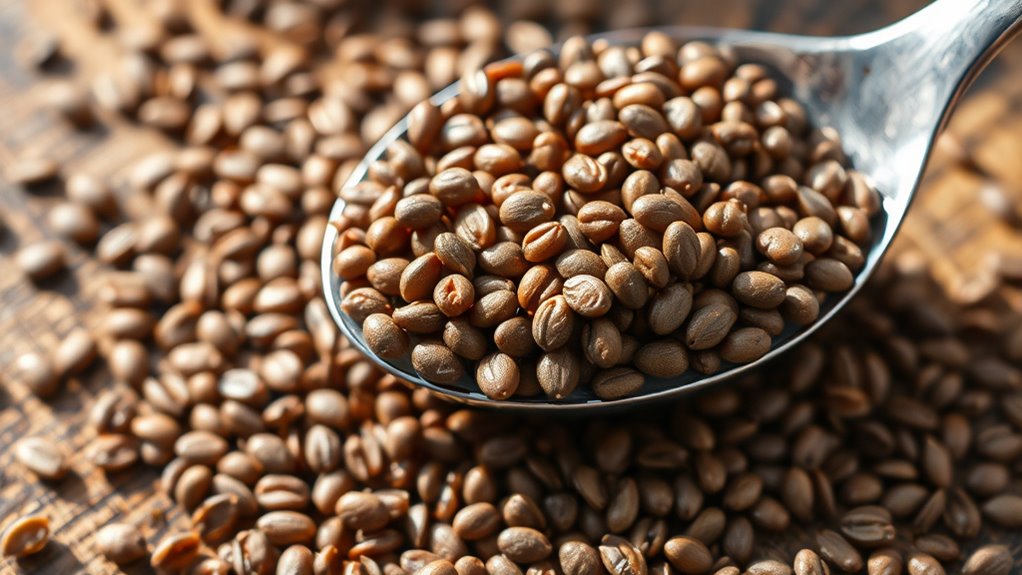
When it comes to choosing the best source of omega-3s, the debate often boils down to fish oil supplements versus plant-based options. If you prefer plant-based diets or want to avoid fish, understanding the differences between popular sources like flax seeds and chia seeds becomes essential. A seed nutrient comparison reveals notable distinctions, especially in their omega-3 content, which can influence your dietary choices. While both are rich in alpha-linolenic acid (ALA), a plant-based omega, their levels and bioavailability differ markedly. Chia seeds generally contain more omega-3s per serving compared to flax, making them a more potent option if you’re targeting ideal omega-3 intake from plant sources.
Delving into plant-based omega analyses, you’ll find that chia seeds pack a higher omega-3 punch relative to flax. This isn’t just about the quantity but also about how your body can utilize these fats. Chia seeds provide approximately 5 grams of ALA per ounce, whereas flax seeds offer around 2.4 grams per tablespoon. This difference means that, gram for gram, chia seeds can contribute more effectively to your omega-3 needs. Additionally, the seed nutrient comparison highlights that chia seeds also come with a broader spectrum of nutrients, including fiber, antioxidants, and minerals, which support overall health.
Another essential factor in the plant-based omega analyses is the bioavailability of ALA from these seeds. Although both contain ALA, the body’s ability to convert ALA into the active forms EPA and DHA—more directly beneficial omega-3s—is limited. However, some studies suggest that the higher ALA content in chia seeds could slightly improve conversion efficiency, or at least provide more substrate for your body to generate EPA and DHA. Furthermore, chia seeds have a unique gel-like consistency when soaked, which can enhance digestion and absorption of nutrients, potentially making their omega-3s more accessible.
Understanding the overall nutrient density of chia seeds, as highlighted in seed nutrient comparison, can help you make more informed dietary choices. In your dietary planning, choosing chia seeds over flax can offer a more concentrated source of plant-based omega-3s, especially if you’re aiming to maximize intake without supplementing. The seed nutrient comparison underscores chia’s advantage in both quantity and nutritional breadth, making them a smarter choice for those committed to plant-based omega-3s. Ultimately, while flax remains a valuable source, chia seeds’ higher omega-3 density and additional health benefits position them as the superior option for anyone seeking to bolster their omega-3 intake naturally.
Frequently Asked Questions
Can Chia Seeds Be Consumed in Cooking or Baking?
You can definitely incorporate chia seeds in cooking and baking. Their cooking versatility allows you to add them to smoothies, oatmeal, or yogurt for extra nutrition. In baking applications, you can mix chia seeds into muffins, bread, or pancakes for added texture and health benefits. Just remember to soak them if you want a gel-like consistency or use them directly for a crunch. Chia seeds are easy to include in many recipes!
Are There Any Allergens Associated With Chia or Flax Seeds?
Imagine reaching for your favorite smoothie, only to notice a sudden itch—that’s how seed sensitivity or allergen cross reactivity can show up with chia or flax seeds. While rare, some people may experience allergic reactions, especially if they have nut or seed allergies. It’s wise to start small and monitor your response. If you notice symptoms, consult a healthcare professional to rule out seed allergies or cross-reactivity.
How Do Storage Needs Differ Between Chia and Flax Seeds?
When it comes to storage conditions and shelf life, chia and flax seeds differ. You should keep chia seeds in an airtight container in a cool, dark place; they have a long shelf life of up to two years. Flax seeds, however, need to be stored in an airtight container in the refrigerator or freezer to prevent oil oxidation, with a shelf life of about six months to a year. Proper storage helps maintain freshness and nutritional value.
Are There Age Restrictions for Consuming Chia Seeds?
You might wonder about age restrictions for consuming chia seeds. Generally, chia seeds are safe for most ages, including pediatric consumption, but it’s best to introduce them gradually. For young children, consult a healthcare provider first to confirm they’re appropriate. Keep in mind that chia seeds expand when soaked, so serve them in small amounts and monitor for any allergic reactions or digestive issues.
What Is the Environmental Impact of Harvesting Chia Versus Flax?
When comparing the environmental impact of harvesting chia versus flax, you’ll find chia generally has a smaller ecological footprint. Chia’s sustainable farming practices require less water and land, reducing its environmental impact. Flax cultivation often involves more intensive land use and water, increasing its ecological footprint. By choosing chia seeds, you’re supporting more sustainable farming methods, which help preserve resources and reduce environmental damage.
Conclusion
So, when choosing your omega-3 sources, remember: chia seeds pack more benefits, are easier to incorporate, and offer a versatile option. They boost your health, support your diet, and outshine flax in every way. By making chia seeds your go-to, you simplify your nutrition, enhance your well-being, and stay ahead in your plant-based journey. Choose chia, embrace health, and enjoy the superior omega-3 advantage every day.
